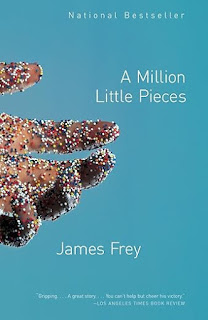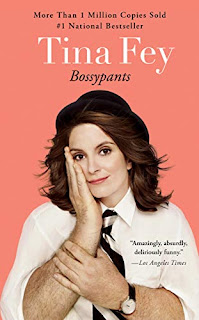Fake Memoirs - Week 7 Prompt
While reading through The New Yorker article (Menand, 2018), I learned that readers are actually lied to way more often that I ever thought. Whether it is passing off exaggerated events as part of their own lives (like James Frey did) or pretending to be a different person all together (like Daniel James and apparently a ton of other authors) there are many books that are not what they seem.
James Frey’s “A Million Little Pieces” was a popular memoir chosen by Oprah for her book club selection in 2005. This memoir talked about Frey’s addiction to drugs and alcohol and the time he spent at a treatment center (History.com Editors, 2011). It was later discovered that Frey had lied about some of the details included in his memoir. In his book he claimed to have been in jail for 87 days and to have had a root canal without anesthesia. Frey eventually admitted though that he actually only spent a few hours in jail and he could not remember whether the dentist had used Novocain or not. Many readers were upset to find out that some parts of this book were untrue and Frey’s publisher even “settled a class-action lawsuit brought by readers who claimed they had been defrauded.”
The New Yorker article (Menand, 2018) claims that there are generally three defenses for works that exaggeration the truth like this:
The theory that even if that exact event did not happen to the author, it happened to someone. This makes it a true life story.
These fabrications and exaggerations convey “what it is really like” to be Guatemalan or in recovery or whatever life story the author is writing about.
The literature professor’s defense: “the argument that the distinction between fact and fiction, although it may appear fundamental, is a fairly recent development in the history of writing, only two or three centuries old.”
There is a quote in support of defense #1 that says, “Readers don’t care whether these things literally happened to James Frey, because they didn’t buy the book to find out about James Frey. They bought it to learn about addiction and recovery. James Frey’s job as a writer is only to convey that experience.” I disagree with this statement. If you are telling me that everything in this book is true about your life then I expect those events to have actually occurred. If you want to write about the life of a group of people in general and the things that happen to them then I expect to have a disclaimer about that. If as an author you tell your readers that something is fact, and then it turns out that to all be lies, you start to lose credibility.
I think Frey could have written his book exactly like he did if he would have been honest about it. He could have said that some parts of it were exaggerated because he knows that some people have experienced these things and he wanted to make their life stories known. Instead, he claimed these life stories as his own and to make it worse, when the truth first started coming out he didn’t confess to what he did, he doubled down. Frey and his mother appeared on “Larry King Live” to defend the book and Oprah even called in to support the book (History.com Editors, 2011). It was only two weeks later that Oprah invited him back onto her show and questioned him about the validity of the book. This is when he admitted that he had “altered and embellished” certain details of his memoir.




I like what you had to say in this post. I agree that Frey could have put a disclaimer on the book and been fine. I do agree that is is crazy that with controversies people just tend to forget. I looked at the Amazon reviews for A Million Little Pieces and most people do not reference the fact that parts are lies and some say the book is good in spite of the lies.
ReplyDeleteAllison and William,
DeleteWhen I read A Million Little Pieces, my copy was labeled as fiction and I had only vaguely heard of there being controversy. Every person who saw me holding the book felt a need to point out, "Oprah said that book is a lie!"
It's still a brilliant book. I don't typically pick up any book (including memoirs) with the belief that every detail will be literally true, as human memory can easily be altered or have gaps. I expect that authors have filled the gaps, based on trying to piece together personal memory, documents, the memories of those around them, and sometimes just remembering a feeling and trying to portray that feeling the best they can.
I think if we start judging books based on the fact that there were controversies about authorship, we get into a very slippery position of starting to judge content as well, and open the door for those clamoring to ban books.
Great insight! You wrote a thoughtful, insightful response and summarized the article well. Keep up the great work!
ReplyDelete